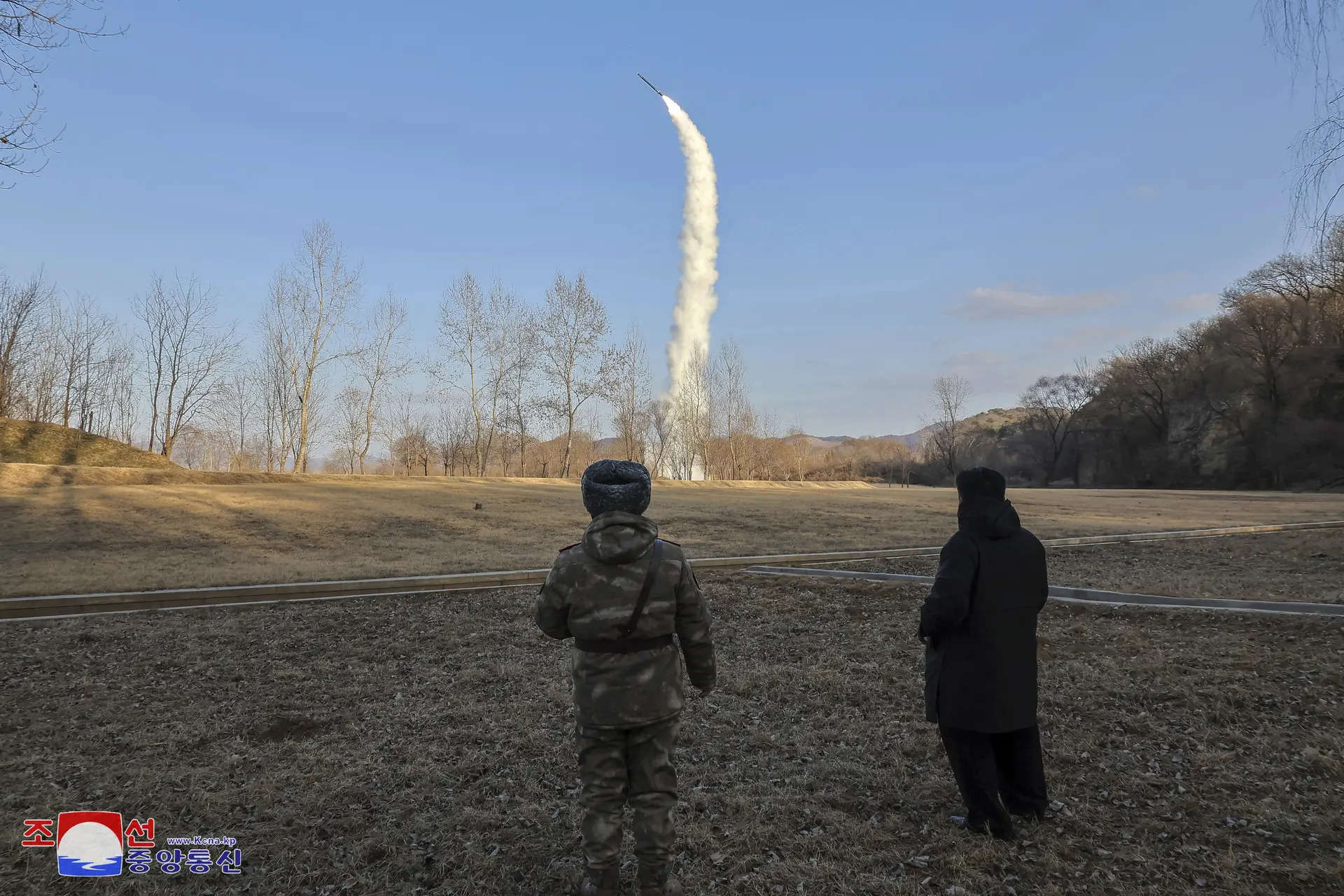North Korea's Cruise Missile Test: A Defiant Response to US-South Korean Military Drills
Get ready for a geopolitical rollercoaster! North Korea just flexed its military muscle, conducting a cruise missile test, its third this year, sparking a fresh wave of tension with the US and South Korea. President Trump's attempt at diplomatic outreach might just be overshadowed by the North's defiant actions. This brazen move underscores the unpredictable nature of the situation on the Korean peninsula.
North Korea's Cruise Missile Test: A Show of Force
North Korea proudly declared its successful test of a new sea-to-surface strategic cruise guided weapon system. Kim Jong Un, the North Korean Supreme Leader personally oversaw the test, a fact highlighted by the state media outlet, Korean Central News Agency (KCNA). The term 'strategic' is significant, implying these missiles are nuclear-capable, and are thus of significant military and political importance.
A Long-Range Threat
KCNA reported that the missiles followed complex flight paths covering an impressive 1,500 kilometers (932 miles) – a significant range, suggesting potential for broad regional strike capabilities. While these claims cannot be independently verified, they undoubtedly raise international concerns, adding to the complex geopolitical environment.
Implications of the Test
This assertive missile test comes at a sensitive time. It follows a series of US-South Korean military exercises that have infuriated North Korea, provoking their strong and explicitly negative response. This missile demonstration shows the North isn't about to back down from confrontation anytime soon.
US-South Korea Military Drills: A Source of Tension
The recent joint military exercises by the US and South Korea have triggered North Korea's ire. The North views these drills as invasion rehearsals, a long-standing and key contention point in their antagonistic relationship. This perception serves as a critical backdrop to the North's military maneuvers, increasing anxieties concerning military escalation.
A Defensive Stance?
The US and South Korea insist that these exercises are purely defensive in nature, designed to maintain regional stability. However, with North Korea's rapidly developing nuclear and missile technologies, these exercises might appear increasingly provocative from the North Korean perspective. Such a viewpoint highlights the difficulty in de-escalating tension when different parties perceive events so differently.
The Escalation Cycle
This back-and-forth escalation cycle, where military drills are responded to with missile tests, and further drills occur in response, is a dangerous pattern with the potential to rapidly escalate to an unrecoverable stage. International pressure and sustained diplomacy is critical to changing this perilous cycle of action-reaction. Many strategists are studying this dynamic closely and worry that miscalculation on either side could trigger a broader conflict.
President Trump's Outreach: A Path to Diplomacy?
President Trump's repeated expressions of his personal connection with Kim Jong Un have many considering the possibility of renewed diplomacy between the US and North Korea. Trump's comments regarding Kim and a potential effort to initiate dialogue raise important hopes that diplomacy could possibly solve this complicated problem. These discussions are critical to maintaining regional stability, as military solutions rarely offer the long term peace that diplomacy does.
Uncertain Future of Diplomacy
However, the recent events cast doubt on the prospects of this reaching a conclusive positive outcome. While a potential negotiation might have promise, there are great uncertainties of its chances of successful resolution. Considering North Korea's latest show of force and heightened tensions over the US-South Korea drills, a rapid successful conclusion is unlikely.
Balancing Security and Diplomacy
The Trump administration's focus will likely continue to be a delicate balancing act – maintaining regional security while attempting to re-open diplomatic pathways. Success requires deft engagement, strong diplomacy, and significant international cooperation to influence and hopefully de-escalate North Korea’s actions. This is clearly a vital issue affecting international security and global stability, needing great political care.
The Future of the Korean Peninsula
The situation remains incredibly precarious. North Korea's actions signal a hardened stance, while Trump's intentions hint at a continued desire for dialogue. This presents the world with a difficult, complex puzzle which necessitates urgent, international engagement to achieve positive de-escalation, diplomacy, and lasting peace. Whether this will prove successful is still an unanswered question.
Uncertainties and Challenges Ahead
Many geopolitical strategists are deeply uncertain about the future of the Korean Peninsula. Navigating this high-stakes game requires careful consideration of the military capabilities, the unpredictability of both players, and the strong diplomatic implications for this key international region.
International Cooperation is Critical
Addressing this regional tension effectively necessitates a coordinated, international response. Open dialogue, clear lines of communication, and significant coordinated actions across involved governments and other major players are needed. Such combined initiatives are paramount to achieving durable peace and a stable future for the entire region.
Take Away Points
- North Korea's cruise missile test signifies a significant escalation of tensions.
- US-South Korean military drills are perceived as provocative, fueling the conflict.
- The potential for renewed Trump-Kim diplomacy remains uncertain amid current events.
- International cooperation is crucial in de-escalating tensions on the Korean Peninsula and finding peaceful diplomatic resolution.




